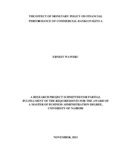| dc.description.abstract | The purpose of this study was to establish the effect of monetary policy on financial
performance of commercial banks in Kenya. This study adopted a descriptive survey of
commercial banks in Kenya. The main reason for selecting descriptive research design
was because it provides a knowledge base when little is known about a phenomenon or
such things as clarification of a situation, classification of information, or description of
subject characteristics that will aid in the refinement of the research problem, formulation
of the hypothesis, or design of data collection and analysis procedures. Secondary data
was collected from financial reports of commercial banks in Kenya from 2008 to 2012
Regression analysis was conducted in order to establish the effect of monetary policy on
financial performance of commercial banks in Kenya Monetary policy was measured
using three variables which were the independent variables of the study. These variables
included the deposits made by the commercial banks to the Central Bank of Kenya, the
base interest rate that is usually provided by the Central Bank of Kenya and the amount
of money the commercial banks have invested in government securities. The dependent
variable of the study was the profitability of the commercial banks in Kenya and this was
measured using the return on assets as a percentage. The findings from the study
confirmed that monetary policy explained 54% of the variance in the profitability of the
commercial banks in Kenya. This was a clear indication the variance that remained
unexplained by the monetary policy variables was 46% and this could only be explained
by other variables that were outside the scope of this study. These findings are in line
with that of Fatade (2004) who in studying the effect of monetary policy on performance
of banks in Nigeria established that various monetary policy measures instituted in the
country over the years have directly and indirectly affected performance of the banking
sector in a number of ways while includes Banks profitability, Deposit/Savings
mobilization Loans & Advances and so on. He further confirmed that the effectiveness of
bank's performances depends on the instruments used in macroeconomic policies and the
prevailing economic conditions and the deregulation of the sector has led to a number of
improvements. . He further confirmed that the effectiveness of bank's performances
depends on the instruments used in macroeconomic policies and the prevailing economic
conditions and the deregulation of the sector has led to a number of improvements. In the
year 2009, monetary policy still explained a significant variance on the profitability of
commercial banks in Kenya but with a reduced percentage than what it was in 2008. In
2009 the variance explained was 49.2% which was less than half of the total variance on
the profitability of the commercial banks. The same trend was replicated in the
subsequent years 2009, 2010 and 2011 The findings further indicate that monetary policy
variables such as the amount of investments in government securities; amount of funds
commercial banks deposit with CBK and the average base rate of the CBK have a
significant impact on the profitability of commercial banks in Kenya. | en |

